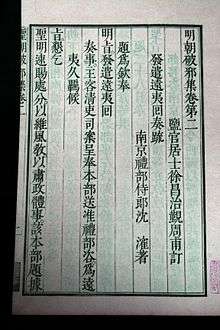Zhu Hong

Zhu Hong (Chinese: 祩宏; pinyin: Zhù Hóng; Wade–Giles: Chu Hung; 1535–1615) Chinese Buddhist leader and anti-Jesuit. He was known as the “Master of Yunqi”, after a monastery restored in his honor. He was born in Hangzhou into a family with the surname Shen. Zhu was an excellent student, although he never succeeded along the path of officialdom. His first connection to Buddhism was that of the Pure Land variety. After failure in the official examinations he became a monk at thirty-one despite the existence of his second wife, who later became a nun. Zhu Hong died at the age of eighty-one. Zhu Hong is best remembered for his persistent hostility to Roman Catholicism. Zhu’s writings are a direct rebuttal to the Jesuit Matteo Ricci (利瑪竇).
Traditional Buddhist monasticism had declined by Zhu Hong’s age. The English translation of heshang (和尚) as “monk” by the late Ming is perhaps inappropriate. A better rendition might be “priest” as it is often used in Japan to describe those specialist practitioners of funeral rites and memorial services. Zhu Hong himself complained that “Monks are also geomancers, diviners, physiognomists, physicians, gynecologists, potion makers, spirit healers and alchemists. All of the above entail the extreme demise of Buddhism (Sanbi, p. 12b).” The Jesuit entry into sixteenth century China placed them in the middle of such conditions. For Zhu Hong and other Buddhists the Jesuits were an additional headache to a long list of serious problems. Zhu Hong’s rebuttal of Catholicism was the first of a longer and ever-growing response.
At the first stage of anti-Catholicism the Buddhists had a weak grasp of the religion. Zhu’s Tianshuo (天说, Explanation of Heaven) appeared in his Sanbi collection in 1615. Matteo Ricci’s monumental theological work Tienzhu shiyi (天主實義) had already appeared in 1596. Zhu Hongs polemic coincided with the political appointment of Shen Que (沈隺, d. 1624) as vice minister of rites in Nanking (Nanjing) and his initiation of an anti-Catholic campaign from official circles in 1616. Zhu Hongs collected essays, the Zhuzhuang suibi was written and published in three sections, the Chubi (初笔), Erbi (二笔) and the Sanbi (三笔), modeled after the classic Song period collection Rongzhai suibi. Zhu Hong’s first collection was published in 1600 at age 70, the second and third at age 81 in 1615.
Books
- Yu Chun-fang, Renewal of Buddhism in China: Chu-Hung & the Late Ming Synthesis, Columbia University Press, 1981, ISBN 0-231-04972-2
Articles
- Carpenter, Bruce, E. "Buddhism and the Seventeenth Century Anti-Catholic Movement in China", Tezukayama University Review (Tezukayama Daigaku Ronshu), no. 54, 1986, pp. 17–26. ISSN 0385-7743
- Yu Chun-fang in Goodrich and Fang ed., Dictionary of Ming Biography, Columbia University Press, New York, 1976, vol. 1, 322-324. ISBN 0-231-03801-1